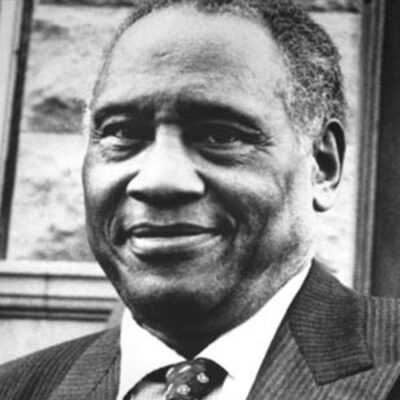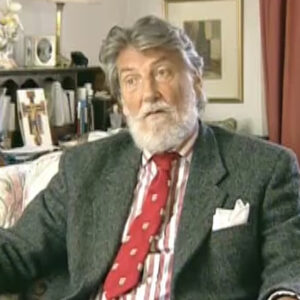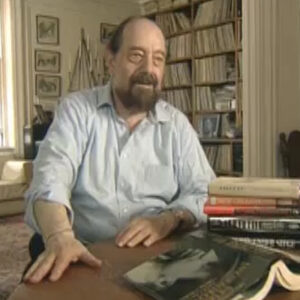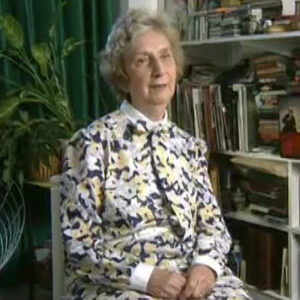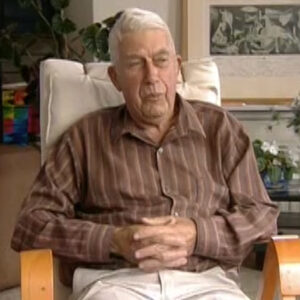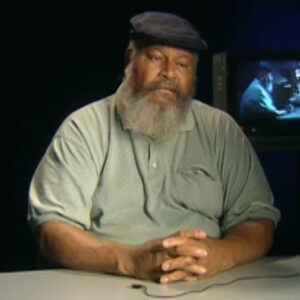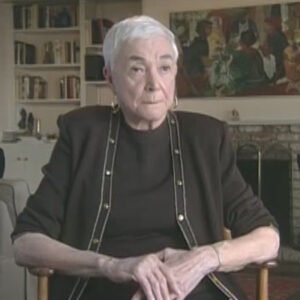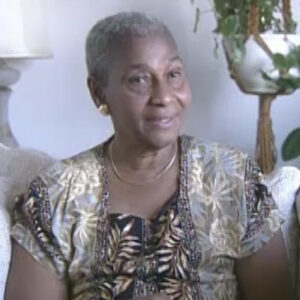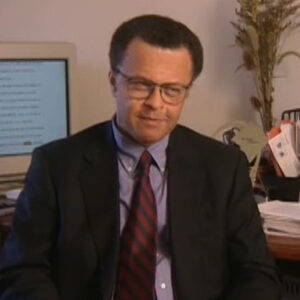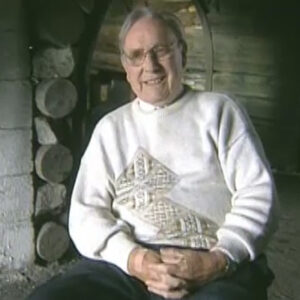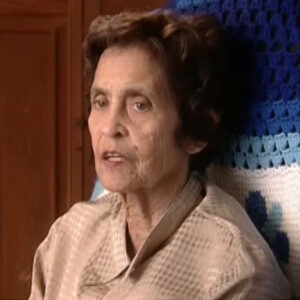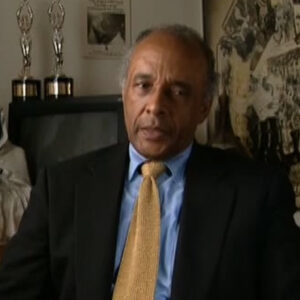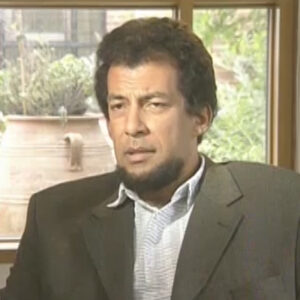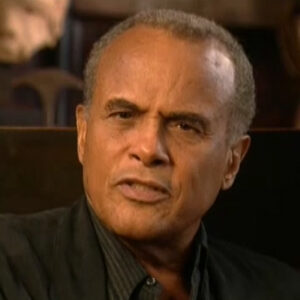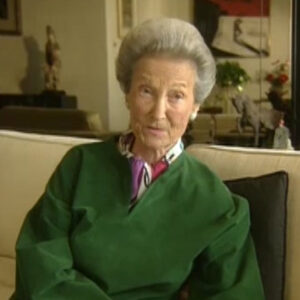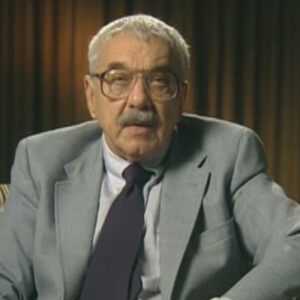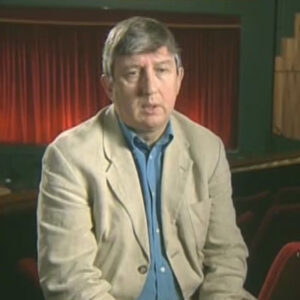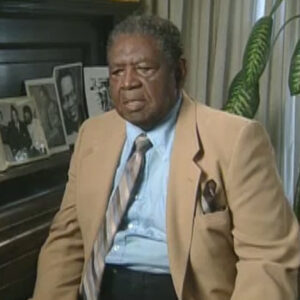Speaker Someone I need to know is when Wilson was beginning this film career. What was the range of roles for black people during his 20s and 30s?
Speaker The range of roles for black people were limited to buffoons, clowns, maids. They were always very subservient characters, you know, just above slaves. You know, they were grinning. I mean, that was just the narrow little slot that they were brought in for, like comic relief or any racial relief, so to speak, you know, and there was at the very beginning, right through the 30s and 40s, there was fundamentally a need to make black people inferior, not only a need, it was almost like a law. You know, thou shalt not show a black person as a human being. You know, it is written. And if you did, you got into a lot of trouble. I mean, it was really a code. It was it was very much a part of the same kind of code that protected sexual display or the fact that there was a law in Hollywood, the code, let us call it, against all kinds of profanity. You couldn’t denounce religions and so forth and so on. And you couldn’t portray miscegenation. And when and when that’s written in the code, it gives us an example, relations between blacks and whites. So that really was the code.
Speaker So that sort of like conditions, everything but within that. The only people who made any kind of success were, first of all, comedic characters, it would be a great breakthrough for an actor, a black actor, to have a dramatic role, you know, just a straight, dramatic role. But they were they were all limited to comedy and they were all limited to the several caricatures.
Speaker OK, now for the second.
Speaker OK, now, against that background, I mean, how would this to me? How would you characterize Paul Robeson’s attempt to use film as a political tool, as an artistic tool?
Speaker I thought Robeson was heroic and trying to alter the image of black people in film. Film was a particularly resistant expression or form in which black people tried to alter the general impression of black people. You could do something on the stage. Rosa did a lot of really authentic and great work on the stage. He did left wing dramas. He did Shakespeare. You could do things in music with ropes and in a concert and so forth. But the society knew that the movies were the place where the fundamental national ideals were set up. And in this society, they want to protect that arena more than any other. And it was more political pressure. It was a bigger form, it was more expensive and so forth. And so to break the barrier against showing black people as human, there would have been a great accomplishment. So that was one of his ambitions to do that to to alter the perception of black people in movies.
Speaker Do you do you think it was successful?
Speaker I think it was one of the ironic failures, really, of Robeson’s career, that he did everything well. He couldn’t think of anything. He couldn’t do. You know, he could have run the world and said, you know, with with his left hand while he played basketball with his right, he was everything just fell into place for him. But that’s one place where he had very few victories and a lot of defeats.
Speaker Now, do you do you see his film career as just film or do you see a division like the British stuff? Do you make a distinction between his work, his film work in Britain and its home work in America?
Speaker The work that Rosen did in Britain is in many ways the saddest work of all, because Robeson made films the United States or for Americans abroad. And he was not satisfied with those films, you know, and so he went to Britain and he met the best people, most artistic people, the royalty, the artistic royalty. And he thought he was among peers and friends, countrypolitan confrere, so to speak, bohemian buddies. And yet over and over again, these sometimes left wing people, sometimes liberal people, put them in films where they served other interests that different from, say, the the lynching racist mentality of American movies. They were into promoting colonialism. They were into promoting Queen Victoria’s great empire around the world. They couldn’t help themselves in many ways or they were just raising the flag for four great England all over again. And so it’s it’s sad to see Robeson, who’s jumped out of the fire, out of the frying pan, into the fire or really more exactly out of the fire, into the frying pan, because the films were a little bit more generous, genteel, etc. But they still were not what Robeson was trying to do.
Speaker Oh, yeah, most people would say Hollywood was a drag, but, oh, all right, I’ll just take a drink of water. Yeah, I was looking at myself with.
Speaker OK, well, when you get to the the British film, it’s almost like the British films, it’s almost like going from negative stereotypes to positive stereotypes and the positive stereotypes are still locking you in into perceptions that are very narrow. He’s such a sweet, angelic, good guy and proud vallet, you know, Song of Freedom. You know, he can sing a song and make everybody happy. He can make enemies reconcile, you know, but he doesn’t have a life of his own, one that can be respected and proud. Valley. And so he is he is use kind of like a pet.
Speaker Wow, he he said that, uh, he thought this proud was one film that he was proud of.
Speaker So. What do you know about his collaboration with the black American independent show Body and Soul? How did you know much about that?
Speaker Well, there’s not much known about how they got along together. It is known that the ropes and made the deal and the contract and the contract between ropes and the show to play part.
Speaker And so he got paid a small amount of money. It was his first film was Robson’s first film. And it’s a very unusual film because it is remember these days with a great deal more interest than it was then. It has picked up a kind of cachet over the years because it is one of pardon me, one of Michel’s best films. And it is what of pardon me, one of his best films. Let me say that again. Yeah. Yeah. Body and soul is fascinating because it has acquired a kind of cachet over the recent years as one of Michelle’s best films, but also it’s one of Obama’s best films and nobody seems to be prepared for that. But it turns out to be the case now. One reason for that is for one occasion, Robeson plays a villain and he’s a magnificent villain everywhere else in his movies. He’s kind of like a good guy. You can just rub him and squeeze every so cuddly and and warm and wonderful. But in this film, he’s a he’s a Jack Black preacher who just got out of jail. And he’s he’s he’s pretending to be a preacher. He’s not even a preacher. And he’s seducing women and he’s robbing money from the offering plate and everything. And and he’s enormous in it. And he’s got the scowl on his face. And he’s he’s a magnificent villain. He also in this place, in this film plays a brother, a twin brother, who is, again, the noble, straightforward, clean cut man that we’re more or less used to for him. But the villain part of ropes and I felt was really good. And that shows you what Robeson might have done as an actor if he was not locked into these public images. Because the terrible thing about the whole thing in those days is that an actor, a black actor, was trapped between the expectations of white people on the one hand, and the needs and the desires of uplift of blacks, on the other hand. But all kinds of interesting characterizations exist in between that and there’s positive images or negative images. But real life just happens someplace else altogether. And in this villainous role, Robeson got close to real life, a real characterization, I think, closer than he ever got on screen before.
Speaker Or since, for that matter, do you think that he was maybe a prisoner of his own uplift ideas in terms of art? What do you try to do?
Speaker I think that Robertson was a prisoner of his own charisma, so to speak, you know, that that he had such a radiant magnetic appeal to people around him that, you know, so that I don’t know if he could see beyond the light that he shone from his own personality, so to speak, you know, and I think sometimes he he exaggerated in his own mind the effect of that charisma, what it could do, how it could change things.
Speaker And so there was a there’s always a feeling that is not quite in touch, you know. I mean, it’s almost like we say, celebrities don’t have a chance to live real life when they’re in the public. Well, he was always in the public eye and it was always like real life was always just smiling at him, you know, doing something wonderful for us, Paul. You know, and so he got to be very trusting. Around people in that kind of frame of mind, and they did it and they do him in the.
Speaker Good, this is OK, um, how much is known about the. Not much is known.
Speaker I mean, the film that’s very rarely seen is borderline and, uh, was this a studio film or was this like just people playing around or what? How do you know how it how it came about?
Speaker Uh, borderline was a trip. It’s very interesting. Fascinating film in many ways.
Speaker Oh, it was.
Speaker The bottom line was, was a trip, it was in many ways one of the fascinating exceptions in Robeson’s career, just as body and soul is kind of accepted. He had some very interesting moments in his film career, maybe on the margins. Bottom line was the work of some basically American avant garde is some bohemian types. And they were fascinated by ropes and as more or less an artistic object, you know what I’m saying? And had that the.
Speaker Yeah, yeah.
Speaker OK, so borderline was yeah, OK, borderline was a trip, it was a fascinating exception to the normal run of ropes and films, just as Body and Soul was, and it was made by a group of American avant garde is very much bohemian, modernist and so forth, who perhaps saw possibilities and using Robeson in a way that he was not used.
Speaker They insisted on making a very low budget and and didn’t make much money out of it.
Speaker But we suppose for a second it is as bad as of this Varoga.
Speaker OK, OK.
Speaker Borderline was a trip, it was an exception to the usual run of ropes and films, just as Boring and Soul was, it was made by a group of American avant garde bohemian types, sort of like the lost generation that Hemingway talked about. And it was made.
Speaker We’re going to have to the because you got to go and yeah, OK, OK, if you want to go ahead. It was made by someone. We got the other part three times, so, OK. I don’t think we do. Yeah. That thing was there all the time. OK, all roll. Got it.
Speaker Bottom line was a trip, it was a film made by some avant garde American avant garde bohemian types, escapees from the last generation, you might say, and it was different from most of our other films. It was set in Switzerland, in a small village. And what you have are these two black people robes. And Essy, as they played in this one and two white people and there’s maybe three white people and they’re circling around each other as though there may be going to get involved in some kind of hanky panky, which they do. They start crossing racial and sexual lines, you know, and they spend a lot of time just voguing and looking at each other and being significant and everything. And nobody knows quite what the story is about. But what it really is about, you can say, is this myth of the noble savage who’s come to civilization and turns out to be superior to these decadent, jaded Europeans, you know, who are very sophisticated and very much attracted to these these black people. It’s a case of jungle fever, really, you know, the jungle fever in the Swiss Alps, so to speak. And so it’s a it’s a striking film. It’s interestingly shot. And it has it has character of a sort. It really has a kind of character to it, even though the character that the film has is very arty and rather pretentious.
Speaker What do you know how Paul got involved in that scene or that particular film?
Speaker No, no, I don’t I don’t see Paul was he was an icon for for the left artist. Bushwas the artistic bourgeoisie. He was the ideal of what is what I call the Bozak Niekro. That is to say, he was a figure that artists tended to want to to frame as the perfect image for black people. The Bozak Negro is is the one who who is the figure dressed up at Bussard Balls with a certain kind of characteristic African Negro that sometimes primitivist demeanor and he fit that ideal for for so many avant garde artists, particularly those who photographed him, as in those photos that were made of him, knew it was pretty much the same kind of fascination with his exotic black beauty. So so he would have met many people who would be interested in him in that way. And these people persuaded him and I say to participate in the film.
Speaker Well, OK. Now, given that take off from that and explain, you know, those photographs of news.
Speaker I mean, to what? Explain to us how. Robeson’s image, his physical image, how did that play out sexually? Mm hmm. Um, maybe not class, but how did how did his sexuality either increase or decrease his attraction to people who wanted to use him in media, especially in the movies? Mm hmm.
Speaker I want to talk a minute about the image of the visual image of Robeson in a more general way. When Robeson appeared in a movie, he was under the same curtain, so to speak, that all black males appeared under. And that is the primary concern in Hollywood movies and even in British movies when the black male appeared was, do we have to be afraid of this person? What do we have to fear this person? Is he someone who will shake our civilization or is he someone who, although he may have enormous strength and power, we can somehow tame? And I think we can see how in many of these films there was great satisfaction that that has enormous appeal, is almost King Kong kind of strength, could be tamed and channeled. And he turned out to be civilized after all. And I think that there was a similar kind of fascination in the left bohemian scene with ropes and as a kind of exotic, noble, savage, so to speak, who portrayed the the vitality and the strength and the vigor that for these people existed beyond Europe, beyond America and then the Third World.
Speaker And there was and particularly in this case, an enormous sexual attraction to his grand body and his magnificent baritone voice and so forth and so on. So so there was that that appeal. And it shows up in the photos, which are very loving photos, very desiring photos. I wouldn’t be surprised if there’s a certain amount of homo eroticism in some of the photos because he is an icon for men and women in this period. And so there is that fascination in the in the in the photos, I see these photos as very much objectifying robes and almost embarrassingly so.
Speaker It has been noticed that many of the photos don’t even show his head that show his back and is a tremendous muscular development, but they don’t show much of his face. And another thing that’s fascinating about those photos is many of them show him in a cramped space. So he’s been down. And it’s almost as though there’s a need to control all of this muscular power and strength to see that, make sure that is contained in this and this tight, narrow frame. You know, because what would happen if he burst out, I tell you, is a lot like that King Kong thing is what would happen if this got loose in Manhattan, so to speak. And so there’s both the fascination and and in many ways a little bit of a fear in that, you know, Websense stands for perhaps black manhood with all of the negative and positive implications that could have.
Speaker That was great. Oh, great. OK, good.
Speaker Um, OK, I want to get it the average guy, because that seems to be the next.
Speaker OK, now, uh, let’s talk about Emperor Jones. How does that play into Emperor Jones or what do you think of that movie?
Speaker In fact, as a movie, the Emperor Jones, as is known as Robson’s masterpiece as a film actor. And in many ways it is. But it is also an anguishing case, a very ambiguous case of Rosnes persona being used to perhaps.
Speaker Unfortunate end, that is to say, one of the problems of Robeson’s film career is he’s often playing magnificent or these stunning or attractive or fascinating roles in stories that undercut the kind of heroism that he thought should reflect back people’s lives so that he wasn’t, I’m afraid, looked at his part when he looked at a script, he looked for his lines and he didn’t always seem to get the whole picture of what the whole narrative was about. And this was the case, I think, with their photos, where he gets a chance to do more than any other black actor had ever done in a movie in American life, with all kinds of changes, moods and so forth, costume changes, grand speeches and everything, he gets a chance to boss a white man around, which was unheard of and so forth, and to be fearful and to do. But at the same time, the story is basically about the inability of black men to provide leadership in a nation or a society. That’s basically what the story is about.
Speaker And it’s not clear that he understood that. And so that happened more than once. But if you look at the Emperor Jones, what that story is about is about attacking the kind of leadership that Marcus Garvey represented. And in fact, I think that by the time the movie was made, that was in some of the producer’s heads that and there’s a there’s a shot of Robeson where he’s wearing this green tunic, this military tunic with his epaulets on his shoulders. And everything is the same image that the Garvey was photographed by James Madison, the absolute same image. And so Garvey was talking about Africans to lead Africa and so forth, is perhaps a target in this film where ropes and go to an island tried to lead the people and create a disaster. So the performance is brilliant, but the story is is counterproductive in terms of his own ideology.
Speaker What was now, that was one of the films when there was a reaction in the black press. Yeah. So what was their reaction?
Speaker Well, the reaction was double. Some people thought it was great that Robin had a chance to to to be tragic, to be psychologically complicated and so forth as never before. And again, some people were very impressed by the fact that he got a chance to to boss around a white man, you know, for whatever reason that was important. And that was very rare. And that was the first time that it happened. Others saw the film as they didn’t like the crap shoot and they didn’t like the fact that this character was a bad guy, bad guy, a tough guy, person who would kill people and so forth. And so so on that score, many of them denounced the film or they were sad he was in it, but they didn’t like what it represented.
Speaker What do you know what the white press basically said about it?
Speaker Do you remember the white press just like the film on aesthetic grounds? They felt that it was not well-organized. It was that the shooting was too clever to too fanciful. It was out of date. The structuring wasn’t so great. And so that’s what often happens with white reviewers. They miss in many ways the historical importance of the film, looking only at narrow entertainment values. But those narrow entertainment values, they didn’t think too much of the film.
Speaker Got it.
Speaker Do you know much about the proposed collaboration between Globsyn and Eisenstein, about to some of it?
Speaker Not much. Not much. I don’t know. We have somebody. OK, I feel that interests me is is of the river, which I think was the second film I was not was my mother was uh. You see that right? Yeah. So what’s your take on it? Is it still a mistake, like, you know, an early mistake?
Speaker And are there any kinds of things that, uh, A.M. McKinney said, as the River said, is Rivers is a total disaster for her. Nothing can redeem that portrait. And it’s a very difficult instance to redeem Robeson’s participation. I mean, it’s hard to understand how he could have been so deceived. And yet, of course, it’s complicated. Jomo Kenyatta plays a small role in this film, and he, too, thought it was wonderful what was being made. And even for a little while as it was made, both Kenyatta and Robeson were still praising the film. It took them a long time to catch on to the fact that this film was praising British imperialism, uplifting the white man’s burden and making a travesty of black civilisation in Africa. This is incredible to understand and and it’s very difficult to let Robeson off the hook of responsibility.
Speaker In this particular case, public reaction was pretty much the same thing, or the public reaction was in left circles and in black circles.
Speaker It was it was horrendous. And and I think in many cases, Robeson denounces these works after he sees how people respond to them, you know, and said, OK, yeah, you’re right.
Speaker That was a terrible film I’m going to ban. I’m going to try to buy it up myself. He said he tried to buy the film back. I mean, this is a pattern that happens over and over again. He tries to to make a deal with try to make a deal with the devil of of 20th century filmmaking. That’s what happens, you know. And after the deal goes down so far, he says, can I buy my soul back? But the devil of filmmaking says, no, I’m sorry, Paul, we got it now is in the can. And so that happens over and over again.
Speaker Yeah, I. So the.
Speaker I mean, but Sanders is Sanders would have been a horrendous film without voting, you know, but they flew him in for just a bit of trimming, you know, and it raises the frustration of Robson’s.
Speaker Distorted film career to the highest level, it’s hard to sit through that film and not get infuriated not only towards the filmmakers, but towards all of British imperialism. It’s hard not to get furious with that, you know, because, I mean, the whole the whole story is being played out again, you know, that ropes and being exploited is like millions of Africans and societies being exploited, you know, and and the lie that’s being told about ropes and ropes is like the live is being told about African civilisation. But it’s enormously frustrating because here he is trying to overturn these lies and he’s lending himself to them.
Speaker Oh, it’s painful for a tiny bit of all you get. I don’t ever want to see Paul Xinyi after this.
Speaker I’m getting out of town, but I’m talking about the portrayal of Africans.
Speaker I mean, how would you let’s say let’s say Song of Freedom and Jericho.
Speaker I mean the African image in that, uh. I mean you didn’t get that better, right.
Speaker Than.
Speaker So, yeah, the image of Africans in Song of Freedom is better, you’re getting closer to positive stereotypes in Song of Freedom than you did in centres of the river, but they are still stereotypes and there’s still a lot of negative stereotypes and song of Freedom. Song of Freedom has a plot sequence is very much like centers of the river where Robeson is trapped by some savage Africans and they’re going to kill him and stab him with spears. Just do all kinds of terrible things to him and his wife in both films and in both films at the very last minute, who comes to the rescue but the white man, you know, or some kind of rescue happens and so forth. He doesn’t achieve his own salvation and so forth. But you do get these very vicious savages who are always, you know, repeating this notion of Africans as uncivilized people, even even in some song of freedom.
Speaker Would you say that because there are, quote, good Africans and bad Africans, would you say rather than stereotypes as complexity as opposed to most of us just showed that Africans are?
Speaker I think what you get is in song, the feeling. I think you still get good Africans and bad Africans, but the good Africans have a little bit more density than they do.
Speaker They they’re not just good because they support the queen. You know, they really have some genuine goodness in them then. But seeing then in Song of Freedom, another thing that’s that’s rather typical in the Roosevelt Room. So there’s always moving in these films from one country to another, sometimes as a fugitive, sometimes searching for something. And in almost all of these cases, he’s bringing the light of civilization to the darker people. And so that song of freedom and he wants to bring scientific knowledge to people who are otherwise caught up with superstition.
Speaker You know, what’s the plot of a plot line of the film? Well, OK.
Speaker Well, so the plot line of Song of Freedom is he is a singer.
Speaker Yeah, he is a singer who is a song. OK, in Song of Freedom. Paul is a a street worker, a dock worker and everyday worker whose voice captivates this impresario, who lets them into fame and fortune as a concert singer. And then with that money, which is kind of surprised to hear his his expectations, he goes to Africa. He always has his dream that he’s connected to some royal lineage in Africa because he is by birth from Africa, sort of like an orphan lost from Africa. And so he decides to go back and look for his roots. And then he has his various experiences where he tries to bring civilization and in fact, does bring a little bit more civilized way of living to the African people. But you can see how that plot, the plots that works, I guess, in many ways trapped then always have possibilities of of exalting some of the things he cared about so that if he’s if he’s invited to play a peasant, he thinks of this as a chance to uplift the image of of working people. You know, and if he’s invited to to do a film about going to Africa, he thinks it’s a chance to lift the image of Africa. But the the roles that he’s tried to play are always kind of close to the stereotypes. The stereotypes always creep back in and snatches the intention that he had in the beginning. So it’s it’s kind of frustrating. But I liked Jericho.
Speaker I thought Jericho was was an exception to most of the now one of the problems with Jericho and some of his other films is when he’s portrayed with a number of other black people. He towers over them so much that that there’s a way that he’s reinforcing the notion that they’re just a common, ordinary or less than ordinary people because he is so exceptional. He’s so, so sterling and the rest of them are sort of slovenly. I mean, I think you can still see that and other recent movies as well. But but that was one of the problems, I think, in that film. But then beyond that, he goes to Morocco, he’s escaped deserting soldier, and he goes to Morocco. And the villa seems authentic and he’s really heroic this time. He really manages to suggest some something of the the nobility that he really possessed. And I think it’s a beauty shot film. It’s what I always enjoy looking at. And I think it’s what I think is his most successful film. Also, I think that King Solomon’s Mines is a successful American film where he got some of the values across that he wanted to get in the mind, but sort of like a straight up adventure movie or an adventure movie. He plays again, a lot like an African prince who is separated from his tribe and he leaves these white hunters to his village. He has his own motivations. He wants to go back and reclaim his throne and they want to discover the riches of King Solomon’s mines. And they collaborate. And but his role and his thinking and his performance, I think, have a lot of stature and dignity. And I do not think in that film that the Africans are portrayed quite as the meaningly as they are in some of the other films. So I think in some ways, mine mind is is is one worth saving, so to speak, along with Jericho. So I think he has had some success with unfortunately, nobody pays much attention to the successes that he did have and everybody knows about the failures.
Speaker Do you think that as a as a as a as the preeminent black screen actor of that period of the 30s, what exactly do you think that he had an impact on other actors and other people?
Speaker Look at him and say, wow, I want to be like that. I want to act like that in your research.
Speaker I heard that. I’ve heard that Robeson had a tremendous impact on other black actors. I can’t quite see where that would have been the case votes style. As an actor, his reputation as an actor is not as high as one would have thought. People say that, you know, people then and subsequently today speak of being stiff and not quite as mobile, that he aimed for broad emotion and brought emotional impact, which in many ways was good because you really got the idea of what he was trying to convey. But subtlety and nuance was not there. So was his acting achievements were separate, I think, somewhat from his presence on the screen.
Speaker He was an enormously wonderful presence on the screen. And that, I think, is one of the places where the potential was not nearly reached. This is what Sergei Eisenstein noticed as well, that he’s always being misused. And we have to just wonder how wonderful he would have been had he had the right parts. There’s a scene in Borderline, which is one of my favorite Robeson, and moments when the camera just looks at Wilson’s face and just closes in on a close up. And then he smiles at like the same takes forever, like a whole minute. And he smiles. And it’s like the the sun’s coming out. It’s such a radiance, a rich human warmth and dignity and intelligence. It’s just an enormous, wonderful moment. And you look at that and you see what a power that would be if that were harnessed on the screen for some kind of artistically credible uses. It just marvelous things, marvelous moment.
Speaker And so we look at that and we say, well, but that was that moment. So Watson is right now, I think I think one thinks of robots and maybe as as a powerful screen presence that never really became a an acting force.
Speaker What about among newspaper critics and intellectuals? I mean, what’s your take on that take?
Speaker Well, I think that the newspaper critics were well, you got you got a lot of mix in the newspapers and among the critics. Black and white intellectuals are not. You got a lot of mixed responses, sometimes they like tropes and sometimes they didn’t like the film, sometimes they didn’t like ropes and all the film. And a few times they liked both Wilson and the film. The The Black critics tended to focus on Rhodes’s ideological impact, how he was impacting on the perception of the dignity of black people and whites would look more technical performance characteristics or questions of that sort, or how the whole movie shaped up and they divided along those lines. But in many cases of white critics were rather dismissive as a person were a kind of an experiment or a trick that hadn’t worked and worked. Yeah.
Speaker Uh, um. So I think it’s after having seen Tales of Manhattan.
Speaker No, but I can tell by the response to it. And that’s what it says is coming right back. A little bit about that. Yeah.
Speaker OK, what was it about them that made it that made them decide that?
Speaker Do you think Tales of Manhattan was another one of these disasters? And I think that what had happened by the time of Tales of Manhattan, which takes place in 1944, is that the expectations of blacks had risen because maybe it had been a few rather decent portrayals of blacks apart from Robeson’s career. And we’re in a war, you know, and there’s a brotherhood feeling around. Blacks status in the world had risen. And so blacks were more critical of the performance in terms of Manhattan than they may have been had that film been made in the 30s or something of that sort of tells Manhattan is a story of a Coke that falls well, involves the scene where the Coke moves through several stories. And these stories have such stars in them as Rita Hayworth, Ginger Rogers, Edward G. Robinson, Henry Fonda, Charles Boyer, all of these stars and all of these vignettes and so on. Paul Robeson and Ethel Waters are in this final vignette where the Coke falls to them and they are so happy as sharecroppers and so forth. You get a feeling of of of the black peasantry being rather simple and simple minded and so forth. And and so people didn’t like that and then felt again that it was not what he was trying to portray. Again, he was he was thinking of redeeming the value of sharecroppers and pointing to the struggles and so forth and the poverty that should be eradicated. But what people saw was, well, these people are the lowest in the American people, so to speak. And and so, you know, there was nothing so bad about that particular film. But it’s just like the straw that broke the camel’s back because he tried so many times. I kind of wish that he had kept trying because by 44, things might have been about to turn around. By forty eight, things were turning around. So a few more years that he kept making films he might have been able to get some decent parts wasn’t.
Speaker And the other thing about raising the, uh, expectations, it was his role politically, you know, going to Spain, going to Wales, woofing colonialism on his political thing that made black people, you know. Look at him as a as something other than a sharecropper or, you know, a bad portrayal of a sharecropper, so he might have turned himself in.
Speaker Yeah, the contradictions were endless. The questions were endless. Growth never got a chance to play anybody close to what he was, which was a lawyer, a great athlete, a great speaker, a magnificent voice, the voice of the century. He never got a chance to play anything, what he was like. And people saw the contrast between black people. So the contrast between what Robeson was and what he was playing. And that made it even more painful because he was falling so far below what they wanted him to be and so far below what he was in real life. And so one headline said at the end of When Tales of Manhattan came out, Paul, you let us let us down, you know? And so there was a feeling of being let down. And he must have hated that, you know, because it was it was a total contradiction that he was the most magnificent representation of blacks or humanity of his time. And he was so totally unsuccessful in portraying either black people or the humanity on the screen. And yet had he been somebody else, had he not been this great person and all these other areas, we would not have thought that his movie career was all that disastrous. And in many ways, we thought this was pretty good because it was better than what was going down in other places. Because if you compare him with some of the real full time professional, you know, all in buffoons of the period like Stepin Fetchit, you know, he’s way above that and he’s pioneering.
Speaker So it’s a total ironic situation and had a heavy question in my mind.
Speaker Oh, who today most resembles Paul Robeson in terms of mature roles, attempts to portray that kind of stuff? Who would you say today is closest to that in contemporary time? OK.
Speaker I think that Roseanne passed on a very interesting legacy to black actors, particularly through his friendship with Sidney Poitier and Harry Belafonte. And he’s passed on a legacy to all of us, to all of us who are concerned with the representation of black people, because despite his movie career, he set an example for us as artists that is still a sterling example because he was fighting. I mean, there are people who might have had the career of Robeson, as I said before, who have been satisfied with it and would not have it themselves and would have been just taking the money and run. And that was not Robeson was always fighting. And so I think he passed that metal on to to party and Belafonte. And to some extent, I think they’ve passed it on to Danny Glover and maybe a few others. But Glover is one person who who has this need to represent black people in a in a more creative and embracing and the human way. But Glover also has this activist career outside of movies. He does a lot of work with the U.N. for TransAfrica, and he’s a total humanitarian. And he doesn’t think that just being a star is the most important thing in the world, which is, again, one of the wonderful things that Robeson had going for him. He could always turn away from from movies and do something wonderful someplace else.
Speaker OK, is there anything that you sort of wanted to say about this?
Speaker And I know my questions and the questions were stunning and they seemed to squeeze me squeeze and let me see if there was.
Speaker Yeah, let’s give a sense of who was going to show us the script. Yeah, yeah, yeah.
Speaker Oscar Micheaux was this maverick filmmaker who arose in what is called race movies in the 1980s. He was the best, most prolific black, independent filmmaker of his day. Not many people know that there was this whole arena of a black independent films made between 1910 and 1950. And Micheaux was an industrious filmmaker who made 40 films. He was he was a producer, the director, the writer and and a very smart, cagey guerrilla filmmaker, something of a charlatan.
Speaker Some people thought, you know, he was a great talker. Surely a big ego would have been interested to know how he and Rosann got along together. They were both giants in terms of physical size and everything, and both wrapped up in their own personalities. So it would have been nice to know how they got along. But Michel was he was also sort of not fully respected by the talented tenth of his time.
Speaker And so when Rosa made body and soul, Robeson apparently turned away from that film and never paid any attention to it again, maybe thinking that was not up to what he should have been into because the film, but in some ways thought of it first as being crude and and makeshift. But today it looks much more interesting than it did then.
Speaker Another question we hear about is the Broadway star on the Hollywood film star. Was he treated like a film star in Hollywood? I mean, in London, he got a lot of respect. What about this country and also its screen magazines, feature columns?
Speaker I mean, you get the Hollywood star treatment. You get the treatment the white stars got.
Speaker You know, I could fake it, but I really don’t know if he did. I really don’t know. Robson in Hollywood was, I think, a kind of novelty act, kind of a curiosity. And I don’t want to compare him to. Well, it’s kind of a novelty act. And it’s very interesting how at one point he wanted to have final cut on tales of Manhattan and Carla MIL, one of the powerful producers those days that even Garbo doesn’t get final cut. And but he he was clearly on the level with the great stars. But I think on the basis of what he had done outside of films, and I’m sad that he was a great personality, as maybe Michael Jordan might be a great personality, you know, in Hollywood.
Speaker And they respect that. But I don’t think he got the respect that actors got in about showboating. I mean, that’s sort of the one I was really good at. But I really can’t I haven’t seen it. I could I could say with the critics, but I’m really beginning to forget what they said at this point.
Speaker Yeah, because it comes out of what, S.A.G.. You referred to his magnificent presence on the screen. How do you weigh that versus no matter what the story was, was a better he was up on that screen for black viewers and African viewers are not to have done the film.
Speaker Yeah, it’s a great question. Yeah, yeah, I think, uh.
Speaker We often have this magnificent personality, this magnificent presence on the screen, and we could ask ourselves, was it better for black people who wanted to see themselves and see themselves in some kind of honorable situation was better that he was on the screen or should have been better had he not been on the screen? Well, to tell you the truth, I think that depends on the film. Again, there for some people in Jones, just this magnificent carriage is enough. For others. The story itself has got to be one or the characterisation has got to be one that can be ennobling as well as simply the admiration of his body. And so I think that I respect those people who are more critical and demanding more of them than simply being gorgeous and being black. But there were many people who were very happy just to see him there.
Speaker And all black people knew the struggle he was going through and they knew the fight he was making. And then black people never put him down for his film because they knew the whole picture and they knew they knew what what the odds were. It was virtually a law that black people would not be shown as as reasonable human beings. And so black so black people understood that they loved him nevertheless. But in many cases, they knew that he wasn’t able to achieve what he wanted.
Speaker And in and in terms of the general white population, I mean, how do you think that they saw him? I mean, over the of over the range of his career? I mean, today you’ve talked about individual. Yeah.
Speaker I think that Robson’s appeal to white viewers was, again, in the specialized role, this kind of warm, cuddly presence. The singing, you know, was was almost crucial. If he didn’t sing, they might have said, get him out of here. I mean, when he sang them, they loved him. You know, his voice was a marvelous belter of resistance. And so I think they loved him in that particular kind of way, which is different than wanting someone like him to come home to dinner, so to speak, and sing for us. Paul, you know, don’t come home, but sing for us one of those kind of things. And so so the response of the miners in Proud Valley to him is kind of like the response of audiences generally. Isn’t he wonderful? You know, and that’s good. But then in many ways, it seems to stop there, the admiration stop there compared to what he was trying to do, which was also to enlarge the response to black people generally.

